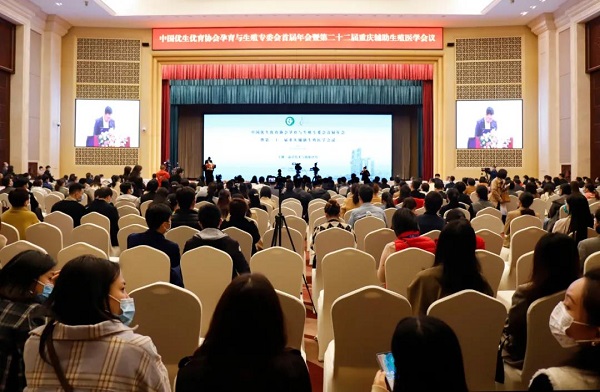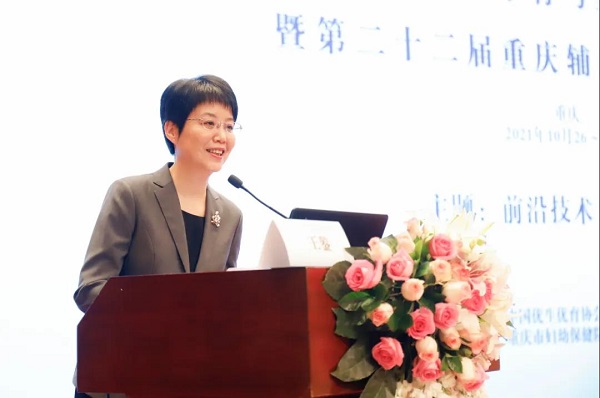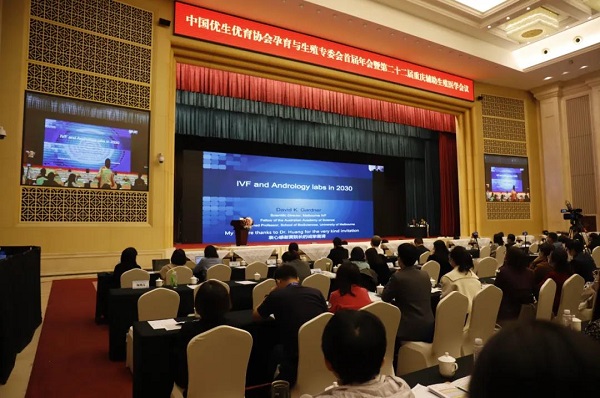CQHCWC holds 22nd Chongqing ART Conference

The 22nd Chongqing ART Conference is held in Chongqing on Oct 27-28. [Photo/CQHCWC]
The first annual meeting of the Pregnancy and Reproductive Committee of the Chinese Association for Improving Birth Outcome and Child Development (CAIBOCD) was held in Southwest China's Chongqing on Oct 27-28, along with the 22nd Chongqing Assisted Reproductive Technology (ART) Conference.
The events were hosted by the CAIBOCD and the Chongqing Health Center for Women and Children (CQHCWC) and were themed on cutting-edge technology and embryo evaluation.
Huang Guoning, director of the Reproductive Medicine Center of the CQHCWC, presided over the opening ceremony.
Wang Jian, secretary of the Party committee of the CQHCWC, addressed the opening ceremony. She stressed that the competitiveness of the center's ART has been strengthened by experts such as Huang Guoning and Ye Hong.
According to Wang, as of the end of 2020, the CQHCWC had completed more than 100,000 cases of "test-tube baby" fertility cycles, and more than 50,000 "test-tube babies" had been born, benefiting families in more than 30 provinces, cities and regions, as well as countries such as France, the United States, and Japan.

Wang Jian, secretary of the Party committee of the CQHCWC, addresses the opening ceremony. [Photo/CQHCWC]
During the event, He Lifang, second-level inspector of the Chongqing Municipal Health Commission, underlined the latest national requirements for regulating the application of human ART. She outlined her vision for the development of reproductive health technologies in China – to meet the basic medical and health needs of the people and provide full life-cycle services, to learn from international academic progress and top technology to improve the quality of reproductive health services, and to improve reproductive health monitoring and protection to improve the quality of the newborn population.
Following the opening ceremony, nearly 50 experts from all over the world delivered online and offline lectures around pregnancy and reproduction. Among them are member of the Chinese Academy of Sciences, Professor He Lin from Shanghai Jiao Tong University, Ma Duan, deputy director of Birth Defects Research Center of Fudan University, doctor Hugh Taylor from the Yale School of Medicine, and professor David Gardner from the University of Melbourne.

Experts hold discussions during the event in Chongqing. [Photo/CQHCWC]
Huang Guoning said that with the in-depth application of artificial intelligence in medical treatment, some steps of ART have now been automated. He also advised women to have children between the ages of 25-35 and regularly receive screenings during pregnancy and prenatal diagnosis.
The CQHCWC held the first Chongqing ART Conference in 1999 and has held it 21 times since then, focusing on topics such as the application of microinsemination in assisted reproduction to all fields of reproductive medicine experimental technology.

 CQHCWC: Nurture healthier futures for children
CQHCWC: Nurture healthier futures for children How to help children develop healthy eating habits
How to help children develop healthy eating habits Wechat
Wechat Weibo
Weibo